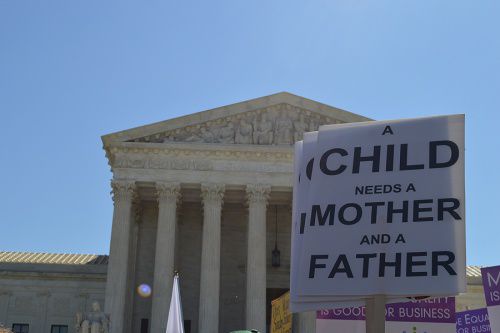The U.S. Supreme Court made same-sex marriage legal in all 50 states in a landmark June 26 decision.
Supporters hailed the recognition of same-sex unions as a major victory for marriage equality, while state’s rights advocates and religious leaders decried the 5-4 Obergefell v. Hodges decision.
“This decision reflects a deep confusion about the meaning of marriage, the family and the human person; about individual liberty; and about the role of the courts and legislatures in our democratic system of self-government,” Archbishop José H. Gomez said in a statement.
“By their nature, court decisions cannot really resolve social questions that are rooted in deeply held values, history and tradition,” he said. “So the public conversation and debate about marriage will continue.”
Ohio’s marriage law was at issue in Obergefell v. Hodges. The plaintiffs claimed the law discriminated by not recognizing same-sex unions contracted as marriages in other states. Several other states were also facing similar cases on the constitutionality of state marriage laws.
The court ruled that states must recognize same-sex marriages under the 14th Amendment and recognize such unions contracted in other states.
Justice Anthony Kennedy, writing the majority opinion, said the court now holds that same-sex couples may “exercise the fundamental right to marry.” He characterized this as a liberty that had been denied to them.
“Same-sex couples, too, may aspire to the transcendent purpose of marriage and seek fulfillment in its highest meaning,” Kennedy wrote.
Chief Justice John Roberts and Justices Antonin Scalia, Clarence Thomas and Samuel A. Alito dissented and, in an unusual step, each wrote separate opinions.
“The majority’s decision is an act of will, not legal judgment,” Roberts said. “The right it announces has no basis in the Constitution or this court’s precedent. Five lawyers have closed the debate and enacted their own vision of marriage as a matter of constitutional law.”
“Mandating marriage redefinition across the country is a tragic error that harms the common good and most vulnerable among us, especially children,” said Louisville Archbishop Joseph E. Kurtz, president of the U.S. Conference of Catholic Bishops.
“Regardless of what a narrow majority of the Supreme Court may declare at this moment in history, the nature of the human person and marriage remains unchanged and unchangeable,” he said. “Just as Roe v. Wade did not settle the question of abortion over 40 years ago, Obergefell v. Hodges does not settle the question of marriage today. Neither decision is rooted in the truth, and as a result, both will eventually fail.”
In an open letter from some American religious leaders, entitled “The Defense of Marriage and the Right of Religious Freedom: Reaffirming a Shared Witness,” expresses the sentiments of many in the Christian community.
“[Redefinition of marriage] changes every law involving marital status, requiring that other such relationships be treated as if they were the same as the marital relationship of a man and a woman,” according to the statement. “No person or community, including religious organizations and individuals of faith, should be forced to accept this redefinition.”
The leaders in the ecumenical letter demanded that the government protect the rights “of those with differing views of marriage to express their beliefs and convictions without fear of intimidation, marginalization or unwarranted charges that their values imply hostility, animosity or hatred of others.”
Kennedy addressed religious liberty concerns in his majority opinion, saying that the “First Amendment ensures that religions, those who adhere to religious doctrines and others have protection as they seek to teach the principles that are so fulfilling and so central to their lives and faiths.”
Helen Alvaré, professor of law at George Mason University School of Law, expressed concern for religious liberty on the Boston Globe’s Crux website.
“When put up against the right to same-sex marriage that was framed today as a right not to be ‘demeaned’ as a homosexual, it is hard to imagine that religious freedom protections will succeed easily as they now have to be debated in each of the 50 states,” she said.
Archbishop Gomez called on Catholics living in the United States to live out their first duty: “to love and to reflect the mercy of God to our neighbors.
“Let us continue to promote the dignity of all men and women, who are made in the image of our Creator and endowed with a transcendent value and destiny,” the archbishop said in his statement. “Let us continue to work for the good of our society and to create a culture of life and love. Remember that holy lives, good marriages and strong families can change the world.”

